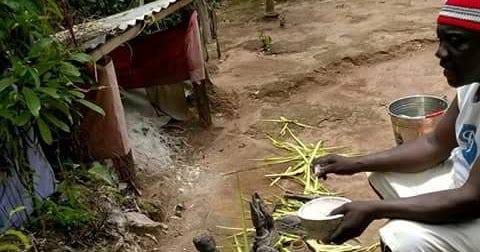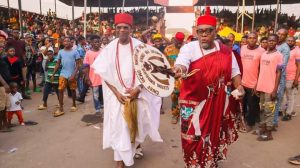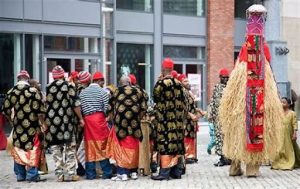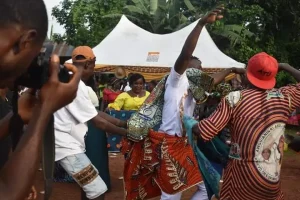Spiritual and moral principles abound in social customs and ceremonies in the rich fabric of Igbo life. Ofo na Ogu is one of these techniques that most stands out as a major idea combining ideas of justice, truth, and integrity. Translating as “Ofo and Justice,” the word Ofo na Ogu addresses both the moral principle of Ogu (justice) and the spiritual meaning of the Ofo. This paper explores the meaning, importance, and customs connected with Ofo Na Ogu in Igbo culture, therefore preserving social order and highlighting its relevance in modern times.
The Symbolism of Ofo
In Igbo culture, the Ofo is a holy staff or rod that represents spiritual connection and strength rather powerfully. Made historically from the Detarium Senegalese tree, the Ofo embodies the moral fiber of the society and the ancestral power rather than just an object. Many times handed down through centuries, the staff carries with it the spiritual heritage and collective consciousness of the ancestors.
Within Ofo Na Ogu, the Ofo represents the divine approbation of moral rectitude and justice. It is part of several ceremonies meant to call the ancestors and ask for their direction on questions of truth and justice. The Ofo is seen as a living thing endowed with spiritual power; its owner is recognized as a guardian of community values and a middleman between the physical and spiritual spheres.
Understanding Ogu (Justice)
In Igbo, Ogu translates as “justice” or “righteousness,” and it captures the moral rightness and fairness ideal. Justice in Igbo culture is not just a juridical idea but also a spiritual and ethical obligation guiding social conventions and personal interactions. Ogu is strongly related to the concept of preserving harmony and balance in society as it guarantees that choices and activities line with moral and spiritual values.
Ogu’s idea is firmly anchored in the conviction that the gods and ancestors are alert viewers of human behavior. Just and moral actions are said to draw heavenly favor; injustices and immoral acts inspire spiritual rejection and even vengeance. Ogu therefore acts as a guiding concept to help maintain social and moral order, thereby supporting the community’s commitment to ethical norms.

The Role of Ofo na Ogu in Conflict Resolution
Conflict resolution and the administration of justice within the Igbo society depend much on Ofo Na Ogu. Whether connected to property, inheritance, or personal grievances, conflicts happen and the Ofo is used to arbitrate and ask for divine assistance. Invoking the power of the Ofo to defend justice and guarantee that the decision conforms to moral and spiritual norms forms part of the custom connected with Ofo Na Ogu.
The Ofo is housed by the elders or spiritual leaders supervising the process of dispute settlement. Holding the Ofo, the ceremony consists of swearing vows and making pronouncements while calling the ancestors and gods to see the truth and direct the result. The conviction in the spiritual power of the Ofo guarantees that all participants approach the procedure with sincerity and respect, realizing that the consequences of dishonesty or dishonesty might be terrible.
The ceremony also helps to reinforce society’s norms and ideals, therefore stressing the need for justice, integrity, and honesty. Involving the Ofo in conflict resolution helps the community to reaffirm its will to preserve justice and guarantee that the moral order is maintained. Since people realize the objective and divine character of the judgment, this procedure promotes cohesiveness and trust within the society.
Igu Ofo and its Connection to Ogu
Igu Ofo is a rite strongly related to Ogu idea. Key to Ofo Na Ogu, Igu Ofo is the official procedure of calling upon the Ofo to testify to truth and morality. Important occasions include swearing oaths, making declarations, or settling problems call for this custom as well.
The Ofo bearer in Igu Ofo addresses the ancestors and gods to observe the events with seriousness. Often held aloft or directed towards the ground, the Ofo represents the link between the physical and spiritual worlds. The words said during the ceremony are regarded as obligatory; the invocation of the Ofo is supposed to guarantee that the result corresponds with divine intent.
The manner of the ceremony preserves the values of justice and moral integrity and links Igu Ofo with Ogu. Involving the Ofo in the process guarantees that the settlement of problems or vows is driven by spiritual power and helps the community confirm its dedication to righteousness. This emphasizes even more the need to keep moral order and follow ethical guidelines.
Ofo na Ogu and Social Order
Maintaining social order and supporting community values depend much on Ofo na Ogu. Involving the Ofo in ceremonies and dispute resolution promotes the moral and ethical norms of the society. The community guarantees that justice is done and that society values by calling the Ofo and asking for divine direction.
Ogu also functions as a tool for social control as it guarantees people follow accepted values and practices. One is discouraged from immoral activity by the dread of divine punishment or the consequences of calling the Ofo wrongly. This emphasizes the need for honesty and justice as it helps to preserve discipline and order within the society.
Furthermore, Ofo Na Ogu promotes a common knowledge of justice and moral principles thereby strengthening community ties. Often carried out in front of the whole community, the Igu Ofo rite strengthens the shared dedication to maintaining moral standards. As everyone understands the need to follow shared principles and honor the authority of the Ofo, this public character of the ceremony serves to foster trust and cohesiveness.
Contemporary Relevance of Ofo na Ogu
Ofo na Ogu is still a vital part of Igbo culture despite the impact of modernism and the proliferation of other faiths. In rural regions, where conventional customs are more firmly ingrained, the ritual remains fundamental in daily life. Considered as emblems of cultural legacy and moral authority, the Ofo and Ogu values are maintained.
Though less common in metropolitan areas and among the Igbo diaspora, the custom of Ofo Na Ogu has symbolic importance. Many Igbo people see the Ofo as a symbol of their cultural identity and moral ideals, and the principles of Ogu continue to govern their behavior. Efforts to protect and advance the Igbo cultural legacy have helped to inspire fresh respect for Ofo Na Ogu’s role in preserving social and moral order.
Scholars and cultural groups have sought to record and honor the Ofo Na Ogu practice so that later generations may appreciate it. This has helped to guarantee that the Igbo people’s cultural legacy includes handed down and kept principles of justice, honesty, and spiritual authority reflected by the Ofo.
Conclusion
A pillar of Igbo society, Ofo Na Ogu marks the junction of moral purity and spiritual power. While the idea of Ogu captures the ideas of justice and righteousness, the Ofo is a potent emblem of truth and fairness. Collectively, they are essential for preserving social order, settling disputes, and thus strengthening common ideals.
Ofo na Ogu is still an important and beloved part of the Igbo cultural legacy even with the changes brought about by modernity and fresh religious influences. Its ongoing relevance captures the ongoing relevance of moral and spiritual principles in forming the life of the Igbo people. Ofo Na Ogu is a living legacy that guarantees the values of justice and honesty are maintained for the next generations by bridging the past and the present.
Please read all our stories on African Culture here




